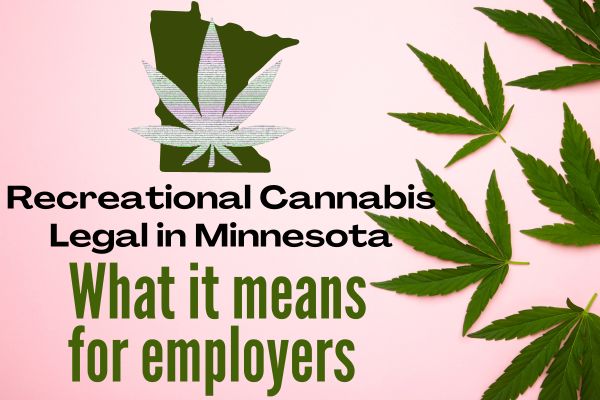Recreational Cannabis Legal August 1 in Minnesota – What It Means for Employers

Guest post by Stephanie Haedt of Peterson, Kolker, Haedt & Benda, Ltd.
Effective August 1, 2023 adults may legally use cannabis in Minnesota. Here is what you need to know:
- Legalizes adult (age 21 and over) recreational marijuana use and treats cannabis as a lawful consumable product like alcohol or tobacco (i.e. you cannot discriminate or retaliate due to lawful use).
- Cannabis flower, cannabis products, lower-potency hemp edibles, and hemp-derived consumer products are lawful consumable products for the purpose of Minnesota law, regardless of whether federal or other state law considers cannabis use, possession, impairment, sale, or transfer to be unlawful.
- Amends the Minnesota Drug and Alcohol Testing in the Workplace Act. Minn. Stat. § 181.950, et. seq. See specifics below.
- Employers may still limit an employee’s use, possession, impairment, sale or transfer during work hours, on work premises, and while operating work vehicles or equipment.
- Employers can terminate, discipline, or take adverse action for use, possession, impairment, sale, or transfer while an employee is working, on the employer's premises, or operating the employer's vehicle, machinery, or equipment if the employer has a clear policy allowing for adverse action.
Testing
- "Cannabis testing" means the analysis of a body component sample according to the standards established under one of the programs listed in the statute, for the purpose of measuring the presence or absence of cannabis flower, cannabis products, lower-potency hemp edibles, hemp-derived consumer products or cannabis metabolites in the sample tested.
- Testing is still allowed, but it cannot be “arbitrary or capricious” and the employer must have written policy.
- The new law shall not be construed to limit an employer's ability to discipline or discharge an employee for cannabis flower, cannabis product, lower-potency hemp edible, or hemp-derived consumer product:
- use,
- possession,
- impairment,
- sale,
- transfer during working hours, on work premises, or while operating an employer's vehicle, machinery, or equipment, or
- if a failure to do so would violate federal or state law or regulations or cause an employer to lose a monetary or licensing-related benefit under federal law or regulations.
- Employers cannot test job applicants as a condition of employment, unless:
- safety sensitive position (definition did not change except to add cannabis = a job, including any supervisory or management position, in which an impairment caused by drug or, alcohol, or cannabis usage would threaten the health or safety of any person);
- peace officer;
- firefighter;
- face to face position requiring training, education, supervision, counseling, consultation, or medical assistance to: (a) children; (b) vulnerable adults; (c) patients who receive healthcare;
- positions requiring a CDL;
- positions funded by federal grant; or
- any other positions for which state or federal law requires testing of job applicants or employees.
- NOTE: You can still test applicants (preemployment after a conditional offer of employment) for other illegal drugs.
- Employers can test employees for the exemptions above, plus in:
- Safety sensitive position (including randomly)(be sure your job descriptions are clear which ones are considered safety sensitive).
- Reasonable suspicion (no change except to add cannabis):
- under influence;
- violated rules prohibiting use, possession, sale or transfer while the employee is working or on employer’s premises or operating employer’s machinery or equipment provided the work rules are in writing and contained in the employer's written cannabis testing or drug and alcohol testing policy;
- has sustained or caused a personal injury; or
- has caused a work related accident or was operating or helping operate machinery, equipment, or vehicles involved in a work-related accident.
- If referred to treatment program and 2 years following (no change except to add cannabis),
- Employers cannot take adverse employment action against employees for legal recreational use, therefore, best practice is to document that employee does not have the "clearness of intellect" and "control of self" that the employee would otherwise have before taking an adverse employment action. Train your managers on reasonable suspicion and proper documentation.
- NOTE: No change to the prior rule, that an employer cannot terminate on a first positive (unless employee refuses or fails to complete a treatment program)!
If you need help navigating the new laws or updating your testing policy and procedures, please email me at shaedt@albertlealaw.com.

Stephanie Haedt is an attorney and shareholder at the law offices of Peterson, Kolker, Haedt & Benda, LTD. Stephanie practices in the areas of corporate/business law, family law, civil litigation, medical assistance, and estate planning. She advises business clients on employment and business decisions, including personnel issues, discipline and termination, and legal compliance.











